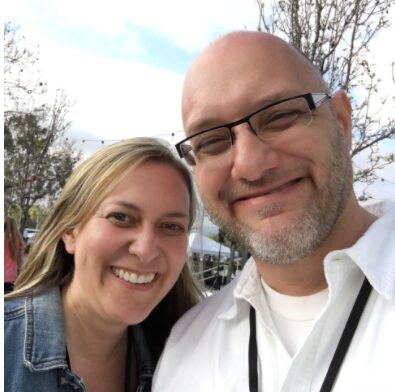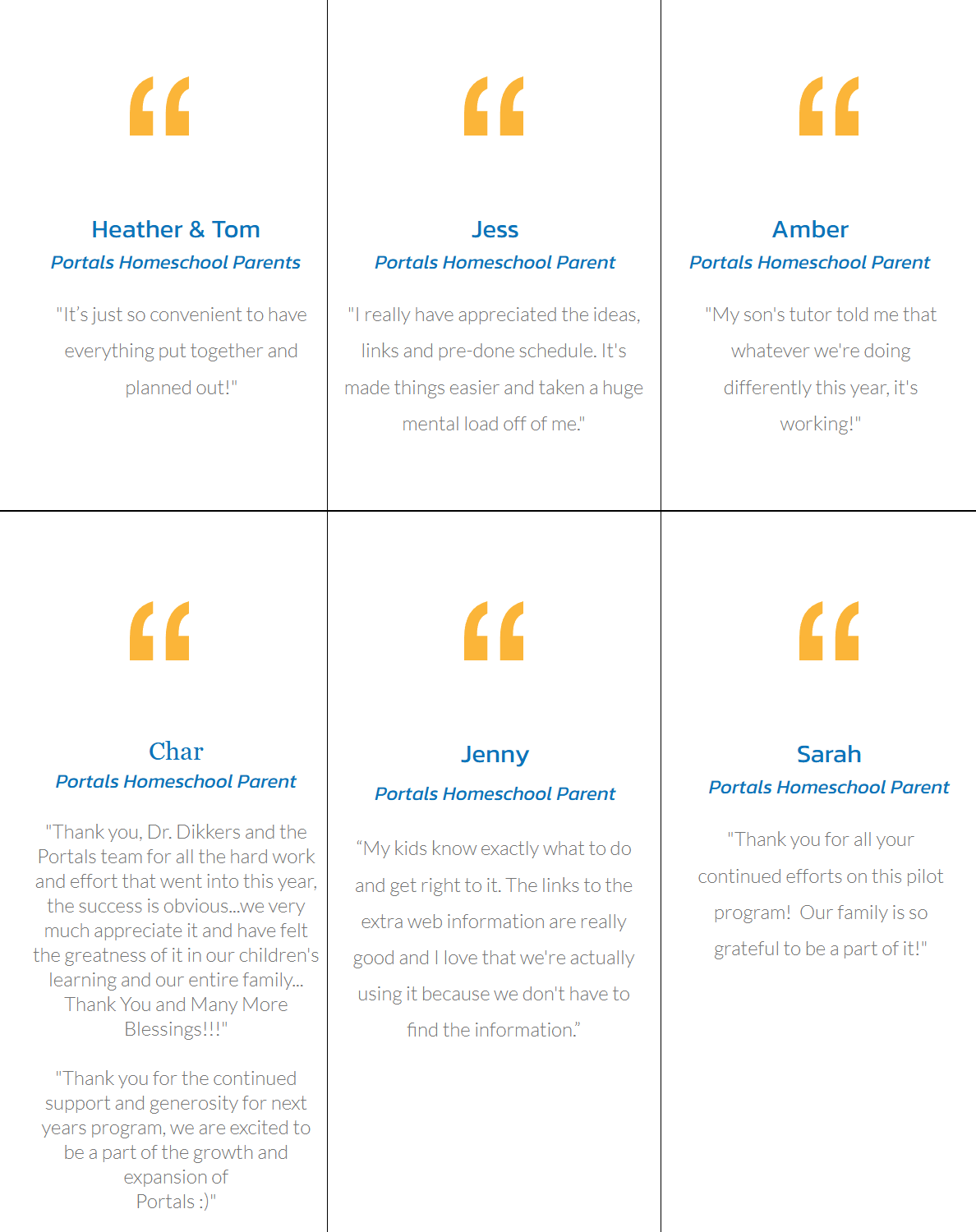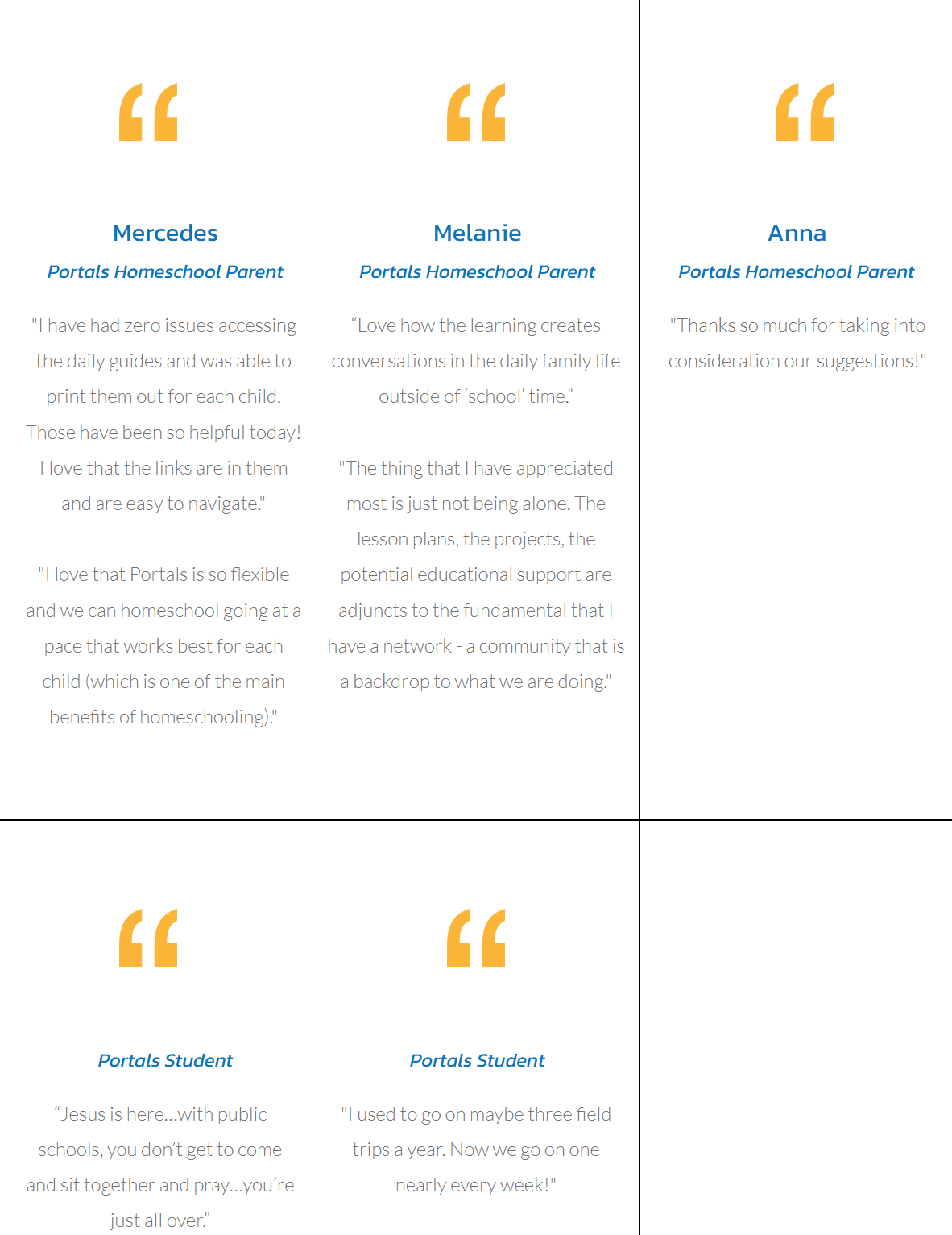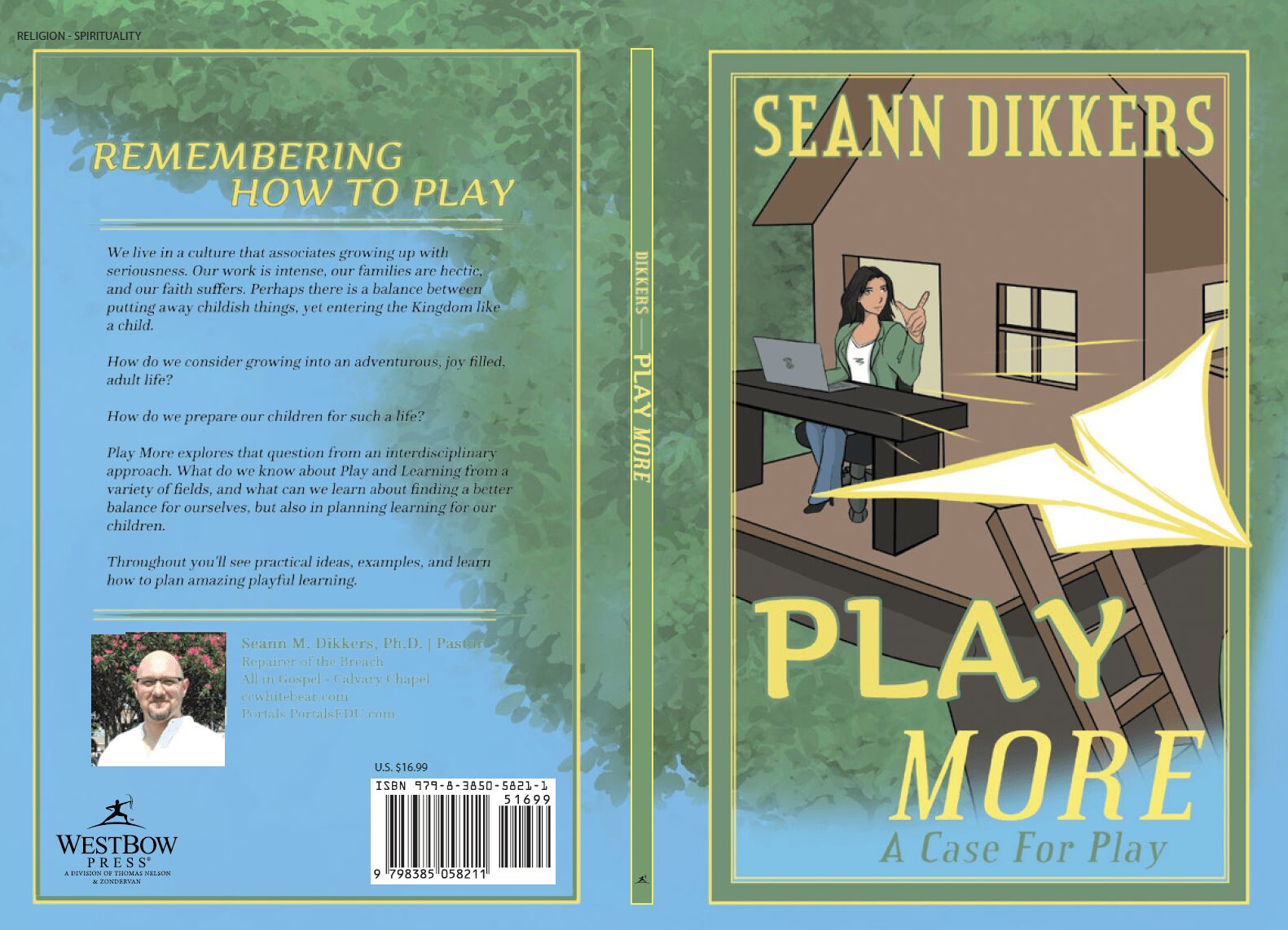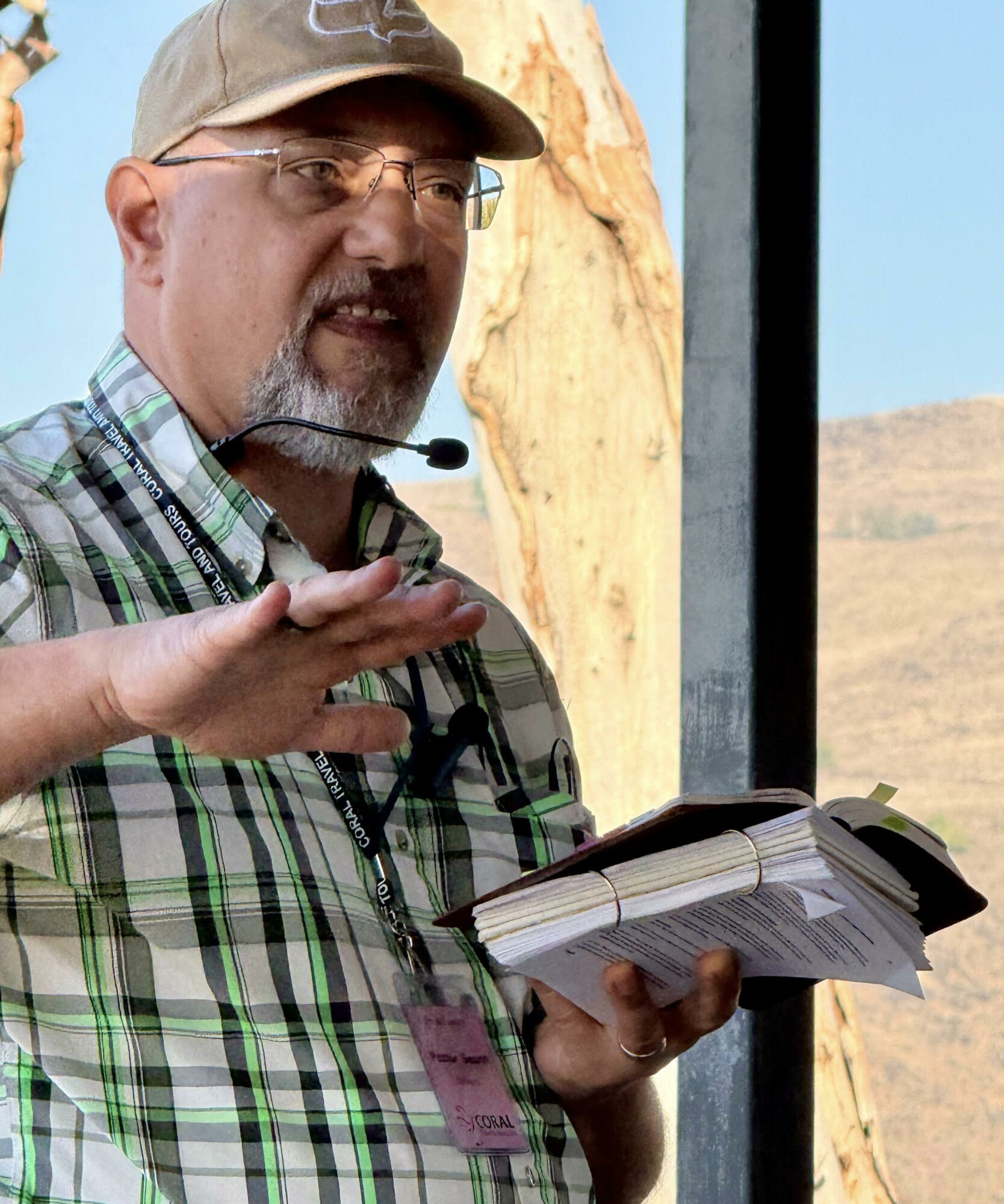

Today we’d like to introduce you to Seann Dikkers.
Alright, so thank you so much for sharing your story and insight with our readers. To kick things off, can you tell us a bit about how you got started?
I’m married to my wife of 33 years Stephanie, have two adult kids and one grandchild. I’m the executive director of Portals, a new project-based learning tool, and Pastor of Calvary Chapel White Bear. I’ve been in education and ministry since college and research curriculum and instructional design.
I come from a family of educators. Grandmother ran a one-room schoolhouse before she met Grandpa, both parents taught, my act of rebellion was to teach history, not math. The calling of education is in my bones and my family has seen massive shifts in how education happens in America.
After teaching and serving as a principal in Northern Minnesota, I found out that I really like to build new experiences for kids. It was easy to pour my heart into a class activity when kids would get rev’d up to do it! The bigger, the more elaborate, the better!
At the classroom level, I quickly embraced projects and portfolio assessment and watched students take ownership of their own learning. When allowing a little choice in media and content, students get excited again–like finding out they have something interesting to contribute. Choice is humanizing, and if I choose a path, I’m responsible for it. Instead of assignments, I offered a variety of ways to show what was learned. So kids made movies, recorded radio bits, posters, even board games to show mastery of subjects. It made grading more interesting than 150 of the same essay. It also lead to good conversations, class discussions, and critical thinking.
As a principal, the same thing. What I loved about the role was finding new solutions to old problems. For the teachers that were willing to try new things, we created a language lab using Rosetta stone to offer over 30 languages instead of the one we could afford in person. We created an entire ‘quest-based’ program for the special education services–eliminating labels, and simply giving students clear discrete ‘missions’ based on where they were developmentally. Every success got calls home.
After fifteen years of seeing pretty spectacular results, two things became obvious. One, the standardization of American education, via No Child Left Behind, was overwhelming. Pressure to teach computational math and reading prose was all that seemed to matter. Second, not everyone in education measures success by student learning. For some it’s a paycheck, not a calling. Room for innovation, or at least educators willing to try new things was shrinking due to external pressures.
My interest in telling the stories of great teaching seemed to be a way to counteract what I saw as a harmful trend. Kids need a reason to learn, that reason should be bigger than a test. So we shoot for life goals, not aptly named ‘common’ core targets. When kids shoot for the stars, things like math become incredibly relevant. Also, not every child has the same goals, gifts or talents, so education must allow some flexibility with their time to invest in life skills for each. Artists and historians may need some hours to pursue their passions–and both will figure out reading comprehension.
Where was the research to show this? Who was telling that story?
So I started over as a researcher at the University of Wisconsin-Madison with the ‘Games + Learning + Society’ group under Drs. Kurt Squire and Constance Steinkuehler. Their research was seeing massive learning curves being dominated by teenagers that loved complex games online–or Complex Semiotic Systems. Apparently, when kids are motivated, learning just isn’t a problem. The only question was, At what point does the learning move from ‘killing orcs’ to engineering civic solutions? Better, How can we as educators help to make that shift? Or even better, why can’t education be more like well designed play?
This is a tough question, because the second we require students to do anything, it’s no longer play or voluntary. We had to invite, not force. Again, humanizing learning. So the research was truly exploratory. Once again, I fell in love with design work–augmented reality, virtual experience, social media, gamer learning communities, third spaces, youth centers, museums– it was all fair game for study, investigation, and research.
At one point we even questioned why research itself couldn’t be a bit more playful, so we built a card game with our favorite theorists, media, and ideas and had players build project ideas via play. The results are in a book called “Real-Time Research”. Great stuff.
All of this kept feeding the question of how to build systems that would solve the problem of tedium in schools. What if the system itself wasn’t built for a digital age? Or individualization? It may not work to design for common uniformity in an age of specialization and skill. Yet ALL money and funding is pouring into a system that is limited by requirements imposed by the state.
As a professor, my writing history continued to advocate for innovation, use of smart media (Mobile Media Learning I and II), use of high potential games (TeacherCraft: How to use Minecraft in the Classroom), and moving towards theoretical work like ‘Quest-based Learning’, and a focus on projects over tests for assessment.
When asked out for coffee, I thought it was to talk about a recent class where I’d converted the classroom into an escape room. They had the period to escape, but along the way, they would carefully study and learn about the life and work of Leonardo DaVinci. The point was to show future teachers that learning could happen without the teacher giving a lecture. But that was not the conversation.
Brent Smith had come with some questions. He had started two schools, one private Christian and another charter in Alexandria, MN. But the results looked a lot like the government schools. He and a group of business owners met for prayer and bible study and were talking about failing scores in the public system–asking, ‘What can they do?’ ‘How can they help?’ Brent wanted to know more about education in general and how to actually innovate. I told him that the industrial model gets industrial results–innovation meant a new model.
He asked, “If you could design a completely new school, what would it look like.” For years, my research work would say, develop a quest-based program based on each individual child with minimal benchmarks and maximum customization. At the college level, Oxford operates in this way. Each student has a mentor, and they talk to determine what needs to be learned to prepare them for their degree. Simple.
Yet, such a system would have to ignore the common core, which dominates time and attention on a massive listing of topics that are only core because a committee says they should be. School boards are beholden to this via testing. If the tests go bad, the state can take over the schools or cut funding. Charters are still tied into this, meaning even the most innovative schools will have to eventually comply or be shut down. If we agree on measures, then “success” is predetermined– I’m not sure I agree on measures.
I’m concerned with the ability to learn, rather than if they know a date in history. I want to see my child be able to use tools to solve problems, not check them at the door. Most importantly, I want to ‘train up a child in the way they should go, so they won’t depart from it”. Faith shouldn’t be excluded from education, that’s preposterous, it’s central to it. Life mission matters before dedication to the grit of learning–it fuels learning. Fill up on it.
The railroads once had a monopoly on transportation in this country. At the time it looked unassailable, untouchable. However, the technology of individualization eventually can erode any monopoly. People like to do things for themselves, in their own time, and in their own way. In fact, for a thing like student learning this is just a matter of having the tools to do it. Give people the automobile and railroads won’t dominate travel.
Early and clumsy efforts to create an “online school” show the need for face-to-face learning-online schools are already showing their weaknesses, and will ultimately be abandoned for child learning. Glowing screens don’t teach, they can barely instruct — relationships motivate real mentorship and discipleship in life. So we understood that anything of quality needed a teacher and a student interaction. What is essential is an adult that cares–we could help with the ‘how to’, if they had the ‘want to.’
We talked about this. Give people curriculum that is easy to use, customizable, and cost effective, and they will eventually prefer just driving their own learning. Give them tools, save them time, and they will outperform any institutional, one-size-fits-all model. Easy.
First, let’s demystify ‘teacher education’ and ‘training’. At the end of the day, we send out 22 year old’s that have observed a classroom for three months via ‘student teaching’ and have had a little advice along the way. Hopefully they know a little something about a subject and child development. We can provide that advice, share those ideas, and support teachers too.
They are then tossed into a classroom of their own and have to sink or swim along the way. Toss up. Any parent of even a single child learns more about child development and if you graduated high school, a quick refresher will give you comparable knowledge of most courses. K12 is mostly not anything that those young teachers can’t just brush up on the night before and teach.
COVID revealed a lot about the system. As kids stayed home, the teachers revealed how much they could offload their role. We have videos, audio, group calls, hotlines, Kindle books, internet search, and even AI assist. The tools are all there, they just needed to be organized. Yet left alone, no digital tool really replaced an in person adult. Without supervision, many kids turned off cameras, played video games, or did social media. So the teacher’s role wasn’t primarily instructional, we have other media for that, it was relational.
Substitute teachers banked on this for decades. As long as a lesson plan sat on the desk, a good sub could run the class very well. Even long-term subs could cover a class if the teacher designed the lessons well. Indefinitely even. Without any subject training, the text, videos, media, audio clips, and activities could deliver content expertise exceptionally.
Socrative method even allows the teacher to learn via questioning along WITH the student. Showing a passion for learning could be done as a learner. So if we use outstanding online resources for subject expertise, with great novels and books, the teacher needs to be passionate enough to have a conversation with the student/s.
Meanwhile the homeschooling movement was already leveraging this. They were already sharing resources, organizing conferences, forming coops. Experts rose in that community based on merit, not degrees, and they were outperforming both academically and socially–virtually every measure of learning. Moreover, they don’t waste time on drivel, so they do it in less time per day, allowing more time for play, exploration, and skill building that leads to career.
Why can’t a model of learning bottle the use of literature, projects, and quests and then provide a portal for parents to access it?
Portals is designed based on the idea that every grade and class has a set of lesson plans put together by an expert teacher–so that anyone can pick up the ‘sub plans’ and teach. We piloted it and saw no discernable difference in learning outcomes after one year. A caring adult, given the right tools, can drive their own car of education – and on average get better outcomes than an industrial school model can.
We now have all core courses built for K-12, with over twelve thousand lessons. Every lesson has a project, every parent can proceed as they want. We’ve had minimal exposure so far, but built servers capable of thousands more users. At this point we have over a thousand active students every day and our top recruiting tool is word-of-mouth.
All it takes is for two friends to talk about issues at school, and the Portals parent says, “Let me show you what we do”. They pull up the dashboard with a lesson and show them that each lesson has three parts, READ, THINK, and DO. Same format every day, but a vast variety of great ideas mixed together. If the parent has the will, Portals gives them a way.
Even for parents that need to work, it’s easy to share the lesson plans with grandparents, other parents, or work in a coop or hybrid with other parents. Also, we are finding that new teachers can have an amazing resource their first few years, instead of guessing what will work, they have a starting point and can edit as they see fit.
Portals is also the only curriculum that allows users to give feedback in live time. Instead of waiting on publishing cycles, we can fix errors or upgrade ideas in a few minutes. So as teachers contribute great ideas, we can make them go live for everyone in the system.
Can you talk to us a bit about the challenges and lessons you’ve learned along the way. Looking back would you say it’s been easy or smooth in retrospect?
Good question!
Nothing new is a smooth ride. Yet, we believe this effort has been blessed from the start. I lot of us on the team have had to make sacrifices to work on this project, so as with any start up, trusting in the mission takes a bit of faith. We weren’t sure if we had funding from year to year, but our funders have seen progress and believe that the timing is right for some truly new answers in education.
Our largest struggle, even today, is explaining what Portals is! It’s not an online school, it’s not just a book list, or curriculum, it’s an entire package equipping you to run K12 project-based learning on your own.
Homeschoolers are the first to get that, as they are used to doing it all themselves, Portals makes sense, “Finally, we don’t have to do all the prep work!”. Slowly we are seeing private schools that want to get away from worksheet/test learning and embracing a better approach to learning. But they have to convince a staff that learning can actually happen without a test.
We have done some training videos to help, but ultimately they’ve been sold the industrial model of schooling since the 1920’s, they don’t know anything different. Even 50 years of homeschool results don’t convince them that there are just better approaches to learning.
Where that’s a struggle, we are also excited when we hear back from parents that give it a try. We keep a file of their comments to keep us going. This changes families, saves self-image, and draws people closer to their family, their lives, and what really matters.
We’ve been impressed with Portals, but for folks who might not be as familiar, what can you share with them about what you do and what sets you apart from others?
PortalsEDU.com
We are the only K12, comprehensive, Christ-centered, literature-to-project-based curriculum available as a digital dashboard for educators.
More time, less busy work. Start teaching today!
We also have a free trial period for those that want to give it a try.
—
Also Pastor at Calvary Chapel White Bear.
What were you like growing up?
I loved playing sports, but at home was all about playing Star Wars and Legos. I grew up reading comic books, mostly Batman detective stories. Then found Terry Brooks and Tolkien books-after which I was a fantasy geek. I’d spend whole afternoons building worlds, maps, stories, and tried to draw pictures to go with them.
We lived near a river and a junkyard… so I loved building forts with my friends. We had little BB guns (like today’s airsoft) that we would run around and shoot each other with. When it was nice out, I was outside. Even when it was not nice out, I’d be outside a bit in it.
Personality wise, I’ve always enjoyed friendships rooted in common interests, faith, and calling. I love knowing lots of different types of people. Different stories.
Pricing:
- 1 Year Subscription = $250/teacher
Contact Info:
- Website: https://portalsedu.com
- Instagram: https://www.instagram.com/portalseducation/#
- Facebook: https://www.facebook.com/portalseducation
- LinkedIn: https://www.linkedin.com/in/seann-dikkers-phd-1175762b0/

